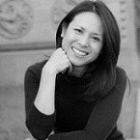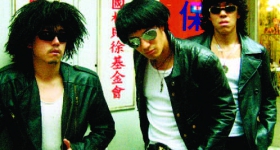Word about the racially-motivated attack on two Asian American men at UC Santa Barbara last March has been traveling through the online social networks and cropping up in the blogosphere for some time. Mainstream media hasn't carried much on it, though, since things have been kept fairly quiet during the investigation, so for some of you, this may be the first you've heard.
Angry Asian Man wrote it up when a letter about the incident started circulating on Facebook, and then again when the official police report was released, so if you want to trace the unfolding of the information, I'll send you there rather than reinvent that wheel. In brief: at around 2 in the morning on March 2nd, UC students Thanh Hong and Paul Elekes were assaulted without provocation by an individual from Pi Kappa Alpha (PIKE) as they walked by the fraternity house. A group of men from PIKE were present as one of their number began yelling racial epithets at Hong and Elekes, and did not intervene as that individual proceeded to hit both the passersby in the face. When police arrived half an hour later, PIKE members denied any knowledge of the assault.
The undercurrent of race tensions in the walls and floors of our lives sometimes ignites. Racist shit happens -- sometimes to us, sometimes around us -- and when it does there are more appropriate responses, and less.
Less appropriate: egging on or passively condoning a racist attack by doing nothing to stop it; closing ranks and protecting the attacker.
.
For this, PIKE has been booted from UCSB's Greek system, and as a corollary, its annual Fight Night event has been canceled. The frat has issued several statements in response to the incident and to these penalties, over the course of the last few months. Those statements I've seen, however, have focused on defending the status or reputation of the frat, or on arguing against the sanctions; some have sought to distance themselves from the violence, by expressing blanket statements against racism.
These latter sentiments sound disingenuous or self-serving to my ears, though, not having been accompanied by apologies or admissions of responsibility. Not all members of PIKE were present, granted; not all those present threw punches, granted; the attacker was a pledge, not yet a full-fledged member of the frat, also granted. But integrity of leadership means coming to terms with the ways in which one’s organization may shape the actions of its members -- asking honestly whether one’s organizational culture may create the expectation that an act of racist violence will not be condemned by its members, but may be admired, or even protected?
PIKE’s defensiveness comes from its anxiety to salvage reputation and official standing at UCSB. But ironically, the way for the organization to have changed the narrative around its role in the hate crime would have been to step up and take responsibility -- rather than working so hard to deflect it.
More appropriate: having the nerve to stand up for something greater than yourself; taking the risk and the time to set the public record straight.
The scrutiny that comes with being the accidental center of a public cause can be highly unpleasant, and I hear Hong did not initially want the case pursued, preferring instead to leave it behind as soon as possible. But this case is not about him, nor his friend; the fact is, it could have been any two Asian men walking down the sidewalk that night, and that is precisely the problem and the definition of a hate crime: racism does not care who you are.
I believe it was the support of politicized Asian American UCSB students and Hong’s pro-bono attorney that braced him for the much longer haul of court proceedings still ahead. The criminal case proceeds with charges for assault and battery, plus enhancement for hate crime. I’m sure there are things he’d rather be doing instead, and repercussions he’d rather not have to wonder if he’ll see.
The students who organized around this incident have devoted evening after evening in the past few months to setting up meetings with UC officials, PIKE and Hong. They’ve followed up with the police department, approached the attorneys to take Hong’s case, and organized demonstrations to make sure that the stakes of the incident were not swept under the rug.
Like Hong, I’m sure there were things they’d rather have been doing instead. Like him, they’ve done what they felt was needed to change the narrative: from that of victimization to one of vindication. From that of being easy marks, to one of being a force to contend with.
And this being Asian Pacific American Heritage Month, I’d like to thank those students for honoring the spirit behind it. APA heritage being not about paper lanterns, but about the coalitions we form for social justice -- because the myriad forms of social and institutional inequality will not right themselves if no one does anything about it.
In most of the other UCs, the Asian American student population stands at 40-some, 50-plus percent. Here at UCSB, where I am a faculty member, we tie with UC Santa Cruz for a distant least, at 16 percent. This makes for a deep sense of disconnect among some of my Asian American students, an experience of social invisibility and vulnerability. But I think it can also make for a greater awareness of the precariousness of racial peace in our society, an understanding that those equalities we currently enjoy are neither guaranteed nor to be taken for granted. These are the stakes of ethnic coalition politics.
Reflections on a Hate Crime at UCSB
Categories:
Contributor:
erin K Ninh
contributing editor & blogger
erin Khue Ninh is a former blog editor and onetime publisher of Hyphen, who won't seem to go away. She now teaches literature in the Department of Asian American Studies at UC Santa Barbara. Aside from Hyphen, erin believes in recycling, Planned Parenthood, and Type A first-borns.
- Read more about Reflections on a Hate Crime at UCSB
- Google+
- Forward
- Print HTML
- 7 comments










Comments